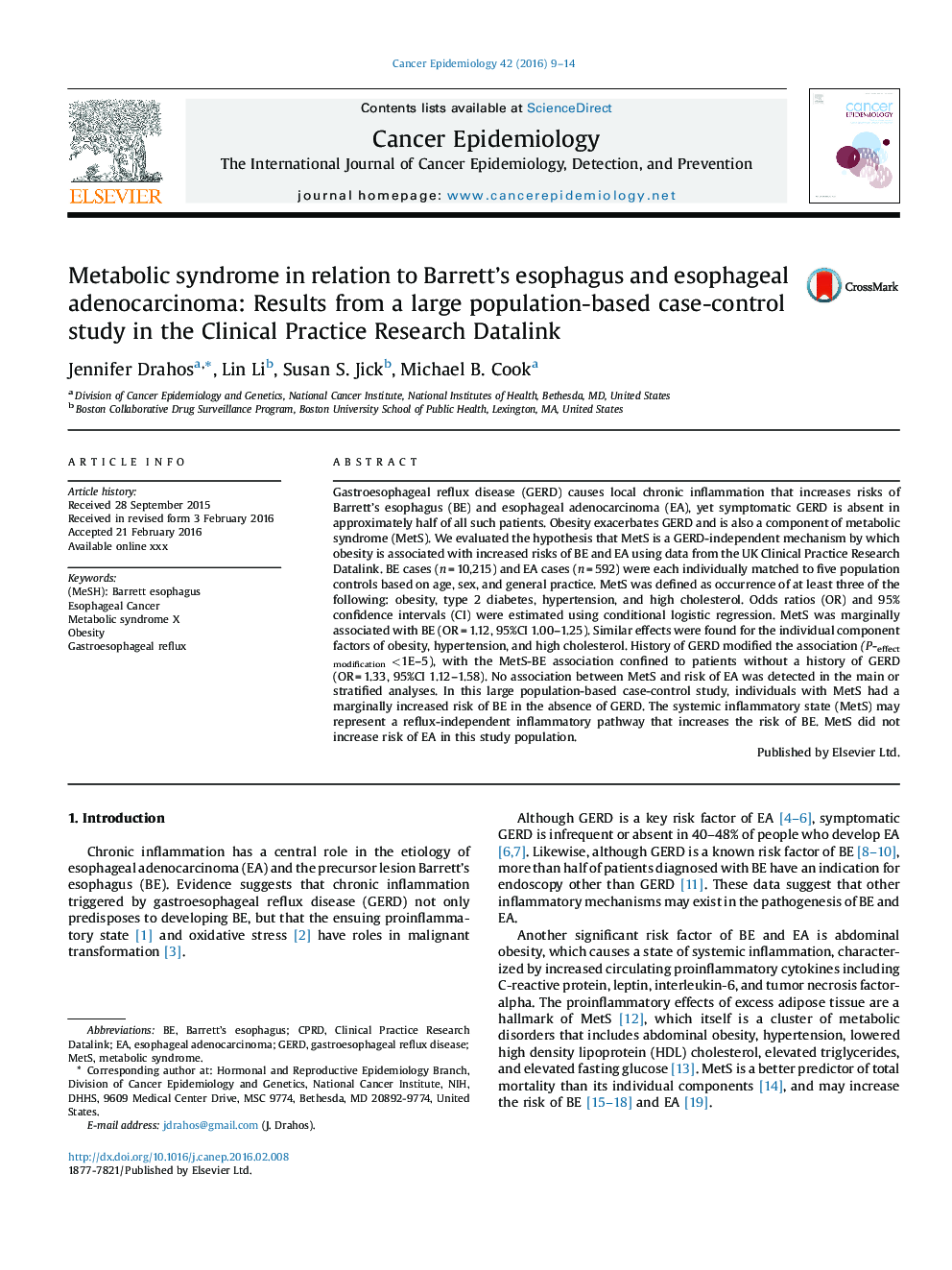| کد مقاله | کد نشریه | سال انتشار | مقاله انگلیسی | نسخه تمام متن |
|---|---|---|---|---|
| 8433181 | 1546533 | 2016 | 6 صفحه PDF | دانلود رایگان |
عنوان انگلیسی مقاله ISI
Metabolic syndrome in relation to Barrettâ¿¿s esophagus and esophageal adenocarcinoma: Results from a large population-based case-control study in the Clinical Practice Research Datalink
دانلود مقاله + سفارش ترجمه
دانلود مقاله ISI انگلیسی
رایگان برای ایرانیان
کلمات کلیدی
GERDCPRDEsophageal adenocarcinoma - آدنوکارسینوما مریgastroesophageal reflux disease - بیماری ریفلاکس معده به مریClinical Practice Research Datalink - تحقیقات بالینی درمانی DatalinkGastroesophageal reflux - ریفلاکس معدهEsophageal cancer - سرطان مریMetabolic syndrome - سندرم متابولیکMetabolic syndrome X - سندرم متابولیک XMETS - متسObesity - مرض چاقی
موضوعات مرتبط
علوم زیستی و بیوفناوری
بیوشیمی، ژنتیک و زیست شناسی مولکولی
تحقیقات سرطان
پیش نمایش صفحه اول مقاله

چکیده انگلیسی
Gastroesophageal reflux disease (GERD) causes local chronic inflammation that increases risks of Barrett⿿s esophagus (BE) and esophageal adenocarcinoma (EA), yet symptomatic GERD is absent in approximately half of all such patients. Obesity exacerbates GERD and is also a component of metabolic syndrome (MetS). We evaluated the hypothesis that MetS is a GERD-independent mechanism by which obesity is associated with increased risks of BE and EA using data from the UK Clinical Practice Research Datalink. BE cases (n = 10,215) and EA cases (n = 592) were each individually matched to five population controls based on age, sex, and general practice. MetS was defined as occurrence of at least three of the following: obesity, type 2 diabetes, hypertension, and high cholesterol. Odds ratios (OR) and 95% confidence intervals (CI) were estimated using conditional logistic regression. MetS was marginally associated with BE (OR = 1.12, 95%CI 1.00⿿1.25). Similar effects were found for the individual component factors of obesity, hypertension, and high cholesterol. History of GERD modified the association (P-effect modification <1E⿿5), with the MetS-BE association confined to patients without a history of GERD (OR = 1.33, 95%CI 1.12⿿1.58). No association between MetS and risk of EA was detected in the main or stratified analyses. In this large population-based case-control study, individuals with MetS had a marginally increased risk of BE in the absence of GERD. The systemic inflammatory state (MetS) may represent a reflux-independent inflammatory pathway that increases the risk of BE. MetS did not increase risk of EA in this study population.
ناشر
Database: Elsevier - ScienceDirect (ساینس دایرکت)
Journal: Cancer Epidemiology - Volume 42, June 2016, Pages 9-14
Journal: Cancer Epidemiology - Volume 42, June 2016, Pages 9-14
نویسندگان
Jennifer Drahos, Lin Li, Susan S. Jick, Michael B. Cook,